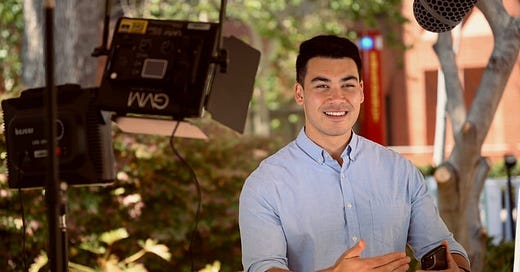
Writing Well Demands Reading Widely: Reflections on Journalism Graduate School
Last week I finished my Master’s degree in journalism. Next week I start work full-time.
While the job has a remote option, I plan to make the move to in-person. As the pandemic wanes and vaccination rates climb, I’m ready to be done with doing life remotely. After the previous year-plus, everyday I’m tempted to delete Zoom from my computer and smash my webcam lens.
Since January 2020, I have dedicated most of my reading time to journalistic work — news articles, non-fiction, long-form journalism. That is the nature of being a graduate student in journalism. To produce good journalism, my professors would tell me, you must consume good journalism in high volume and with a fine-tooth comb.
Notwithstanding all I’ve learned, my recent reading habits have left me wanting. Typically, I am reading anywhere between two to three fiction novels per month. That’s what I've done since high school. Between January and June, I read zero. It’s been the longest stretch without fiction reading in nearly a decade. I felt the impact of this on my writing — less thought to eloquence, more tersity and a greater emphasis on delivering news rather than crafting narrative.
I’ve just finished The Narrow Corner, a novel by one of my favorite writers, W. Somerset Maugham. Waking up to dramatic and well-written fiction each morning and falling asleep each night to the distinct rhythm of Maugham’s writing has rejuvenated me. His characters are alive; they change as the narrative progresses and each individual in the novel has a distinct personality that is believable and anything but generic.
This — in addition to taking a step back from the blistering pace of the news media — has been a calming reminder about the beauty of writing for the sake of writing, without the pressure of delivering news.
Writing news stories, while important and necessary, prioritizes delivering information rather than crafting compelling and metrical prose. At least that’s how I see it. The goal of good fiction, in my eyes, is to craft something that is enjoyable to read. News doesn’t always take on that onus.
Publications like The New Yorker combine masterful reporting and beautiful writing. That’s the pinnacle of long-form journalism. I have no doubt that the talented writers of The New Yorker could have made a career doing either news or fiction. And I’d put good money on all those writers being regular consumers of both fiction and news.
That’s the balance I’ve attempted to create in my own reading habits. Hard news, fiction, long-form and short-form. An ever-changing diet of lengths and styles; a cocktail of poetic and plain language.
The goal of this, ultimately, is to achieve a reading habit that translates into good writing. Good writing requires good reading. The best writers are consummate, dedicated readers.
Reverse-engineering this formula is simple: to become a better writer one must read more and more, and also select their readings with discernment.
All this is a way of saying that journalism graduate school taught me — or rather, emphasized — how your reading habits impact and change your writing style. I’m not sure if this was one of the intended learning outcomes for the program, but it’s nonetheless a worthwhile lesson for budding writers and journalists to keep in mind.
(This is merely one lesson of the many that I learned at USC Annenberg. I entered the program as a green and aspiring journalist, and emerged as an enthusiastic, confident and enterprising reporter. It’s been a wonderful and fruitful year of learning. If you have the opportunity to pursue a graduate degree in journalism, it is a great way to break into the industry, and provides the coaching and experience for even non-journalists to do well in.)











